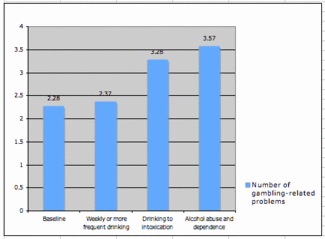Few studies have examined the impact of drinking behavior among individuals experiencing gambling problems. This week, the WAGER reviews a study by French, Maclean, and Ettner (2008), which examined the relationship between alcohol use and abuse and gambling-related problems among a large, representative sample of U.S. citizens.
Methods:
- Data from the National Epidemiological Survey on Alcohol and Related Conditions (NESARC) using a sub-sample of participants who experienced 1 or more gambling-related problem(s) during the past year (N=1,203).
- Measures included number of gambling-related problems experienced by participants during the past year, alcohol use frequency, drinking to intoxication, and alcohol abuse or dependence.
- Probit regression analyses assessed the relationship between the number of gambling problems and drinking behaviors/problems.
Results:
- Weekly or more frequent drinking was not significantly associated with number of gambling problems.
- Individuals who drank to intoxication and those who met alcohol abuse or dependence criteria had significantly higher (p < .001) numbers of gambling problems, even when models controlled for potential confounding variables. See Figure 1.
Figure 1: Number of gambling-related problems with regard to various drinking behaviors among a sample of participants who have experienced gambling problems in the past year (adapted from French et al., 2008).

Limitations:
- Cross-sectional studies do not measure the temporal or causal relationship among variables of interest.
- Potential self-report bias and/or recall bias.
Conclusion/Discussion:
French et al. (2008) found no association between gambling problems and frequent consumption of alcohol. They did, however, find a significant positive relationship between problematic drinking behavior patterns (i.e., drinking to intoxication and meeting criteria for alcohol abuse or dependence) and the number of gambling problems. Thus, participants who drank alcohol to diagnostic level were more likely to have more problems related to their gambling behavior. This finding is consistent with models (e.g. Shaffer LaPlante, LaBrie, Kidman, Donato, & Stanton, 2004) that propose a broader characterization of addiction as including both substance-related and behavioral manifestations (See Wager 10(1)).
What do you think? Comments can be addressed to Ryan J. Martin.
French, M., Maclean, J., & Ettner, S. (2008). Drinkers and bettors: investigating the complementarity of alcohol consumption and problem gambling. Drug and Alcohol Dependence, 96, 155-164.
Shaffer, H., LaPlante, D., LaBrie, R., Kidman, R., Donato, A., & Stanton, M. (2004). Toward a syndrome model of addiction: multiple expressions, common etiology. Harvard Review of Psychiatry, 12, 367-374.




